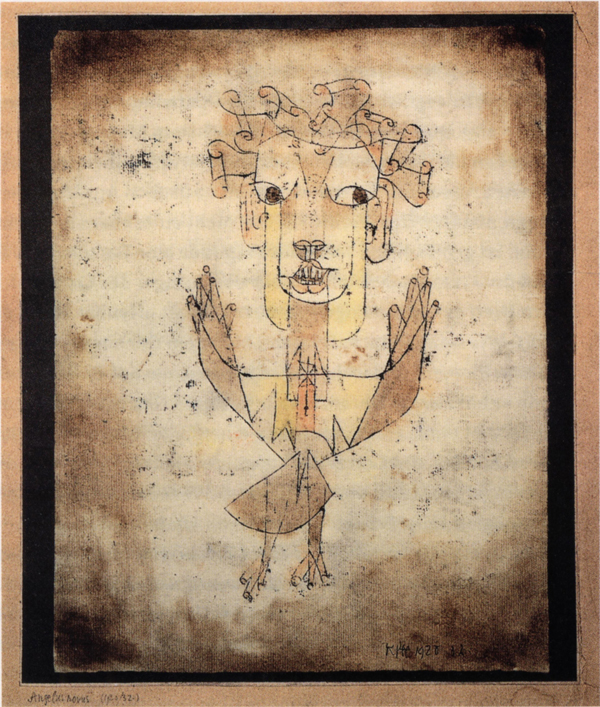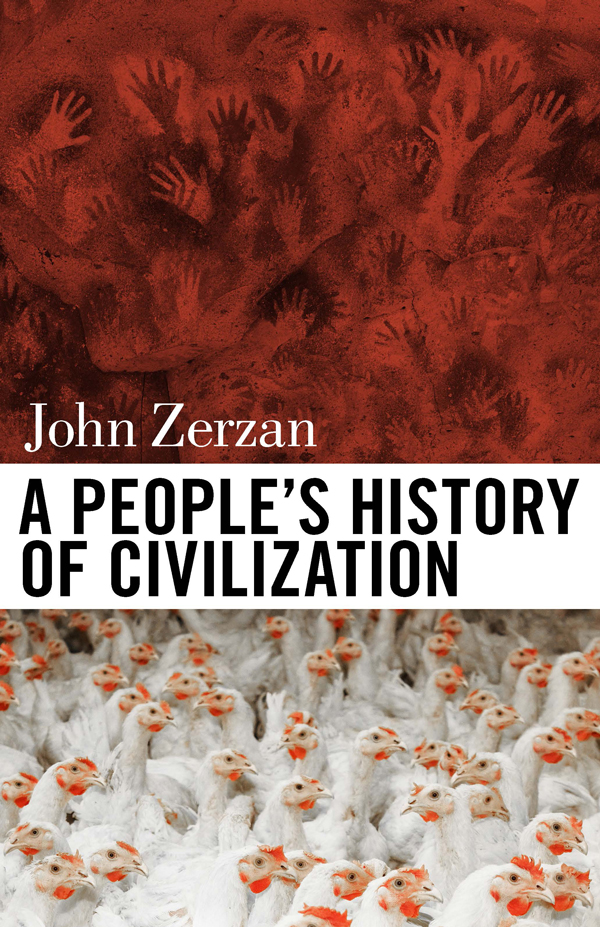I first realized I was an “anarchist”—somebody who doesn’t believe in government—when I first heard the word, probably when I was 11, right around the same time I figured out I was an “artist.” (I didn’t have to look that one up, though I probably should’ve.) I didn’t know what kind of an anarchist I was, though, until I first ran across, then started searching out the writings of John Zerzan, whose most recent book—A People’s History of Civilization—was one of the last titles released by Feral House before our friend, the publisher Adam Parfrey died.
Through Zerzan and his ilk I learned that I was in fact an “anarcho-primitivist”—somebody who thinks that our species took a potentially fatal wrong turn somewhere around, oh I don’t know, agriculture? It seems hard to imagine in the digitally mediated labyrinth through which we all wander aimlessly these days, but for millions of years humans—whose brains were as highly evolved as yours and mine—lived in peaceful equilibrium with the planet—without cops, tax collectors, real estate agents, chief curators, deans of academic affairs, or presidents of the United States of America.
Despite discursive roots extending back to Henry David Thoreau’s proto-ecologism or even Rousseau’s “noble savage,” anarcho-primitivism is subject to the same tsunami of programmatic institutional contempt that faces any philosophical postulate that doesn’t have the preservation of tenure as an inviolable—if unspoken—core tenet. Call it the “Shut up, stupid hippy!” defense.
Yet some of the most intellectually brilliant nonacademic literary/philosophical statements of our time—from Ursula Le Guin’s translation of the Tao Te Ching to Gary Snyder’s The Practice of the Wild to Feral House author Theodore Kaczynski’s Industrial Society and Its Future—are anarcho-primitivist classics, and considerably more persuasive and coherent than anything that has emerged from the academy since at least the early 1970s.
To this list we can tentatively add A People’s History of Civilization—tentatively, because I feel that Zerzan’s magnum opus—A Child’s Introduction to Anarcho-Primitivism maybe—could still be forthcoming. Like most of Zerzan’s half-dozen books, this is a collection of autonomous essays jostling around an ostensibly unifying theme. In this case the perennial question you may ask yourself: “Well, how did I get here?”
Zerzan’s answer: one authoritarian revolution at a time, dragging your feet all the way. Civilization literally means citification, so Zerzan begins by pointing out that “the move from forager to farmer, the move to domestication of plants and animals—and ourselves—was the most deeply qualitative shift in the history of our species.”
Proceeding step by step from the Neolithic forward, Zerzan meticulously places the blame for citification’s discontents—including hetero-patriarchal normativism, urban isolationism, oligarchical privilege, warfare, lousy sex and crappy consumer goods—squarely at the feet of their host organism, and its reproductive mechanism: the exponentially metastasizing parasitical alien intelligence known as Technology.
Zerzan swings between detailing little-known historical episodes of resistance (the Luddite uprisings in early 19th-century England), providing skeptical, citation-rich counter-narratives to schoolbook historiographies (The Fall of the Roman Empire; the causes of WWI), and ranting, with tangible frustration, about what he clearly considers to be the self-evident truths underlying the perfect storm of ecological, socio-political, psychological and epistemological crises into which we are currently steering. One more load of swordfish and everything will be okay, right Marky Mark? Aye, Cap’n Clooney! Full speed ahead!
Where was I? Oh yeah, epistemology. One of the major hitches in anarcho-primitivist discourse (apart from using the internet—or indeed, the printing press—to disseminate it) lies in the fact that, taken to its logical conclusion, anarcho-primitivism has to challenge the validity and authenticity of the very cognitive tools with which its critique is constructed—the abstract symbolic languages that emerged in the Neolithic as the building blocks of capital-H History.
Zerzan gamely tackles this paradox in his penultimate chapter, the jauntily titled “Civilization’s Pathological Endgame,” but it is in his brief afterword that he hits nonlinear paydirt. I find it comforting that in spite of his assertion that Art is an inadequate consolation prize for our demolished communality, the cover design uses an image of the accumulated prehistoric handprint-stencils on the walls of the Cueva de las Manos in Santa Cruz, Argentina to signify pre-industrial community (countered by a flock of chickens awaiting slaughter; us now).

Paul Klee, Angelus Novus, 1920.
In his “Concluding Anti-History Postscript,” Zerzan reproduces a much more recent artwork—Paul Klee’s 1920 monoprint Angelus Novus—alongside Walter Benjamin’s celebrated interpretation (later the basis for the Laurie Anderson hit The Dream Before) which sees the subject as “the angel of history. His face is turned toward the past… one single catastrophe which keeps piling wreckage upon wreckage and hurls it in front of his feet. The angel would like to stay, awaken the dead, and make whole what has been smashed. But a storm is blowing from Paradise; it… irresistibly propels him into the future to which his back is turned, while the pile of debris before him grows skyward. This storm is what we call progress.”
Melancholic? Sure. Pessimistic? WhatEVER. As someone who never signed on for this whole “civilization” thing in the first place, but hasn’t ever given up on art, I find it reassuring that our species’ current untenable position is framed by paintings standing at either end, outside of History.


